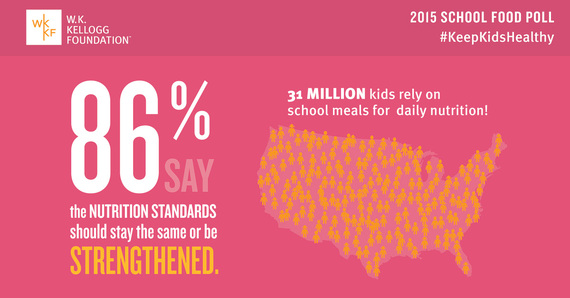Last October, I wrote about Bistro Kids, a Kansas City-based program that augments the federally funded meals at Head Start preschools by connecting kids with healthy, local food, teaching them about good nutrition and giving them a hands-on experience to cook healthy food. The wonderful thing about Bistro Kids is that it reaches children during their formative years, when they're developing lifelong tastes and eating habits.
While I know it's not always easy to get kids to eat their fruits and vegetables, I sincerely believe we can help make sure they develop a taste for nutritious food -- and we can start doing that by supporting more farm to school activities and healthier meals in school cafeterias. We need to make sure there are opportunities in school to learn about good nutrition, so kids get practice making smart decisions about what they eat.
Put another way: If we want kids to make healthy choices -- salads, apples and whole grain foods -- we need to put salads, apples and whole grain foods on their lunch trays.
As you might suspect, I'm not alone in this belief. The W.K. Kellogg Foundation 2015 School Food Poll found that nine out of 10 people believe school meals should be nutritious.
The national school meal nutrition standards help ensures kids eat more fruits, vegetables and whole grains. And kids are doing just that -- a Harvard University study found fruit consumption increased 23 percent, and vegetable consumption increased 16 percent after the new nutrition standards were implemented in 2012.
It's not just foundations or policymakers or advocates that care about these issues -- it's families, the people who see how nutrition standards can impact the ones they love. Parents want their kids to have access to the good food that is critical to their children's overall health and a driver for academic success.
Thirty-one million kids rely on school meals for their daily nutrition. For low-income children, school lunch may be the most nutritious meal of the day. Analysis from the Union of Concerned Scientists' "Lessons from the Lunchroom" shows that having healthy choices at school can significantly shape children's lifelong eating habits, especially for low-income children and children of color. Kids' eating habits significantly impact their health overall, including their risk for obesity, diabetes, heart disease and other health problems.
Healthy bodies also mean healthy minds. Studies show that students who eat more nutritious food are also better performing in the classroom. This means well-rounded meals for breakfast, lunch and dinner and plenty of clean drinking water. Ensuring all of our kids, no matter socio-economic background, have access to food and water that will fuel academic success is critical to equitable child outcomes in school, in health and in their opportunity for success in life.
But it's not just about food; it's also about good hydration. According to the WKKF poll, 91 percent of people say kids need access to safe drinking water in school -- and we know from research that increasing kids' access to and consumption of drinking water supports their health and learning.
Water is such an important issue for families across the country, that 90 percent also say they support making water a preferred beverage in the new 2015 Dietary Guidelines for Americans. Not only do the dietary guidelines influence the school meal nutrition standards, they also shape what kids learn about healthy choices through MyPlate and other nutrition education.
Every child deserves to have an opportunity for a successful future, and that must include early in life, having access to healthy food and clean drinking water.

